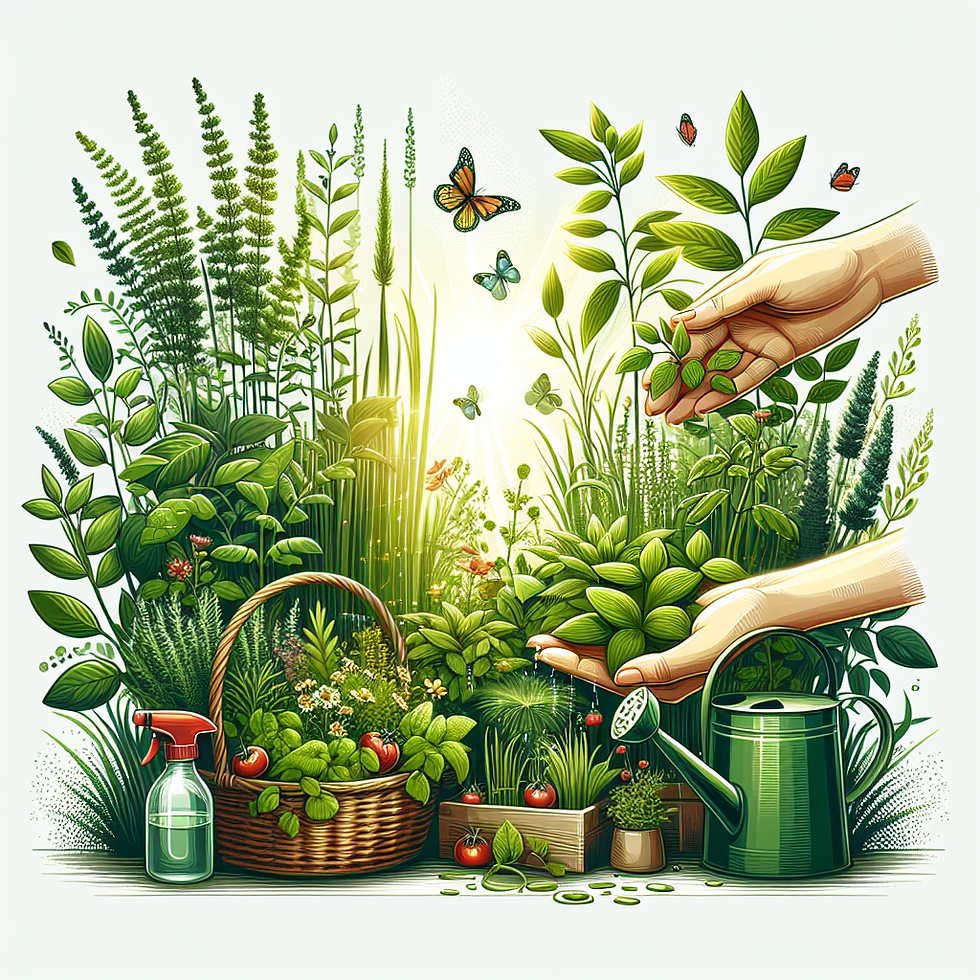The Importance of Organic Practices in Herbalism
- Kaye Ruiz
- Jun 1, 2025
- 6 min read

Understanding Herbalism and Its Roots
Herbalism, often referred to as the art and science of using plants for health and wellness, is one of humanity's oldest healing traditions. Long before the advent of modern medicine, ancient cultures turned to the natural world for remedies to treat ailments, boost vitality, and maintain balance in their lives. From the Ayurvedic practices of India to Traditional Chinese Medicine and the herbal knowledge of Indigenous peoples worldwide, herbalism has always been deeply intertwined with nature. These traditions were not just about using plants but understanding their role within ecosystems, respecting their life cycles, and harvesting them in harmony with the environment.
The roots of herbalism are grounded in a symbiotic relationship with nature. Ancient herbalists observed how plants thrived in specific conditions, how they interacted with other species, and how their properties could be harnessed for healing. This connection to nature is not just historical—it’s foundational. Modern herbalism continues to draw from these ancient practices, emphasizing the importance of working with, rather than against, the natural world. This is where organic practices come into play, ensuring that the integrity of both the plants and the ecosystems they come from is preserved.
What Are Organic Practices in Herbalism?
Organic practices in herbalism refer to methods of growing, harvesting, and processing plants that prioritize environmental health, sustainability, and the avoidance of synthetic chemicals. At its core, organic herbalism is about maintaining the purity and potency of plants while respecting the ecosystems they come from. This means no synthetic pesticides, herbicides, or fertilizers are used in cultivation. Instead, natural methods like composting, crop rotation, and companion planting are employed to enrich the soil and protect plants from pests.
Ethical harvesting is another cornerstone of organic practices. This involves gathering herbs in a way that ensures the plant population remains healthy and abundant for future generations. For example, wildcrafting—harvesting plants from their natural habitats—is done with care to avoid overharvesting or damaging the surrounding environment. These practices align seamlessly with the philosophy of herbalism, which values the interconnectedness of all living things and seeks to promote balance and harmony.
By adhering to organic principles, herbalists not only produce higher-quality remedies but also contribute to the health of the planet. It’s a holistic approach that honors the wisdom of traditional herbalism while addressing the environmental challenges of the modern world.
The Benefits of Organic Practices in Herbal Remedies
When herbs are grown organically, their potency and purity are significantly enhanced. Plants cultivated without synthetic chemicals are free from harmful residues, ensuring that the final herbal remedies are as close to their natural state as possible. This is particularly important in herbalism, where the therapeutic properties of plants are directly tied to their chemical composition. Organic herbs are often richer in active compounds, making them more effective in supporting health and wellness.
Another key benefit is the reduced risk of contamination. Synthetic pesticides and fertilizers can leave residues that not only compromise the quality of the herbs but also pose potential health risks to consumers. By choosing organic, you’re ensuring that your herbal remedies are free from these unwanted substances.
Organic farming also supports biodiversity and soil health. Practices like crop rotation and the use of natural compost help maintain nutrient-rich soil, which in turn produces healthier plants. Additionally, organic farms often serve as sanctuaries for pollinators like bees and butterflies, which are essential for the reproduction of many plant species. By supporting organic herbalism, you’re not just investing in your health—you’re contributing to a more sustainable and biodiverse planet.
The Environmental Impact of Organic Herbalism
The environmental benefits of organic herbalism are profound. Conventional farming methods often rely on synthetic chemicals that can leach into waterways, harm wildlife, and degrade soil quality. In contrast, organic farming practices are designed to work in harmony with nature. By avoiding harmful chemicals, organic herbalism helps protect ecosystems and reduce pollution.
One of the most significant contributions of organic practices is the preservation of endangered plant species. Overharvesting and habitat destruction have put many medicinal plants at risk. Organic herbalists often engage in sustainable harvesting practices and even cultivate endangered species to ensure their survival. This not only safeguards biodiversity but also ensures that future generations can benefit from these valuable plants.
Sustainability is another critical aspect. Organic herbalism promotes practices like regenerative agriculture, which focuses on restoring soil health and sequestering carbon. By adopting these methods, the herbal industry can play a role in combating climate change and fostering a healthier planet.
Organic Certification and Standards in Herbalism
For consumers, identifying truly organic herbal products can be challenging. This is where organic certification comes into play. Certifications like USDA Organic, EU Organic, and others provide assurance that a product meets strict organic standards. These standards typically include the prohibition of synthetic chemicals, the use of sustainable farming practices, and rigorous testing to ensure purity.
Key organizations like the USDA and the Soil Association oversee these certifications, providing a level of transparency and trust for consumers. When shopping for herbal products, look for certification labels and read ingredient lists carefully. This ensures that you’re supporting brands that prioritize organic practices.
At Herban Concoctions, we’re committed to transparency and sustainability. Our products are crafted with the highest standards of organic integrity, ensuring that you receive remedies that are both effective and environmentally responsible.
Challenges in Adopting Organic Practices in Herbalism
While the benefits of organic practices are clear, adopting them is not without challenges. One of the most significant obstacles is cost. Organic farming often requires more labor-intensive methods and yields smaller harvests compared to conventional farming. This can make organic herbal products more expensive for consumers.
Scalability is another issue. As demand for organic herbs grows, producers face the challenge of maintaining sustainable practices on a larger scale. Climate change further complicates matters, as unpredictable weather patterns and extreme conditions can impact crop yields.
Misinformation and greenwashing also pose challenges. Some brands market their products as "natural" or "eco-friendly" without adhering to true organic standards. This makes it difficult for consumers to make informed choices. Education and advocacy are essential to address these issues and promote genuine organic practices in the herbal industry.
How Consumers Can Support Organic Herbalism
As a consumer, you have the power to drive change in the herbal industry. Start by choosing certified organic products and supporting brands that prioritize sustainability. Look for transparency in labeling and research the sourcing practices of the companies you buy from.
Supporting local and small-scale organic farmers is another impactful way to contribute. These farmers often face significant challenges in competing with large-scale operations, and your support can make a meaningful difference.
Advocating for transparency and sustainability in the herbal industry is also crucial. Share your knowledge with others, ask questions about the products you buy, and encourage brands to adopt organic practices. Together, we can create a market that values quality, sustainability, and ethical practices.
The Future of Organic Practices in Herbalism
The future of organic herbalism is bright, with emerging trends like regenerative agriculture and permaculture leading the way. These practices go beyond sustainability, aiming to restore and enhance ecosystems. By focusing on soil health, water conservation, and biodiversity, they represent the next evolution of organic farming.
Technology is also playing a role in advancing organic practices. Innovations like precision agriculture and AI-driven monitoring systems are helping farmers optimize their methods while minimizing environmental impact. These tools make it easier to scale organic practices without compromising their integrity.
Ultimately, organic herbalism has the potential to contribute to a healthier planet and population. By prioritizing sustainability and ethical practices, the herbal industry can set an example for other sectors, proving that it’s possible to thrive while respecting the natural world.
Bonus: Herbal Mocktail Recipe – "The Organic Bloom"
Celebrate the beauty of organic herbalism with this refreshing mocktail!
Ingredients:
1 cup organic hibiscus tea (brewed and chilled)
1/2 cup organic elderflower syrup
Juice of 1 organic lime
Sparkling water
Fresh mint leaves and edible flowers for garnish
Instructions:
In a glass, combine the chilled hibiscus tea, elderflower syrup, and lime juice.
Add ice cubes and top with sparkling water.
Stir gently and garnish with fresh mint leaves and edible flowers.
Sip and savor the vibrant flavors of nature!
For more herbal inspiration, visit Herban Concoctions.
.png)




Comments